Released: 3rd November 2003
Writers: Blazin’ Squad / Andrew Murray / Christian Ballard / Jane Vaughan / Obi Mhondera
Peak position: #2
Chart run: 2-7-14-19-23-38-51-47-50-58
Though often looked down on as pioneers of ‘chav’ culture, Blazin’ Squad became a consistent chart presence during the early ’00s. Yet, even those staunchly opposed to the group’s appeal couldn’t deny Flip Reverse as a genuinely enjoyable track and, quite probably, their best single.
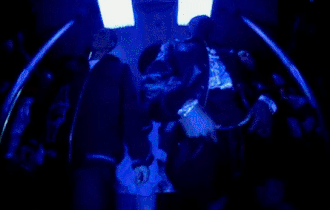
While Blazin’ Squad’s critics would probably never be minded to acknowledge it, the group’s second album – Now Or Never – marked a significant improvement over their first (albeit that’s something of a back-handed compliment because the benchmark was pretty low). Not, in some respects, that it mattered by this point because, by 2003, most people knew where they stood concerning Blazin’ Squad. The ten-piece group were immensely popular with their fans. Yet, they elicited bemusement, derision or ire from those unbeguiled by the hip-hop aspirations of Kenzie, Freek, Rocky B, Melo-D, Reepa, Krazy, Spike-E, Flava, Tommy-B and Strider. They were a divisive act, and it rarely felt like opinion landed between those two extremes.

Even so, Blazin’ Squad were big, and it would be disingenuous to suggest otherwise, even if that wasn’t necessarily apparent from a commercial perspective. They’d amassed four consecutive top-ten hits by this point, having topped the chart with their debut (mainstream) single, Crossroads (a reinterpretation of Tha Crossroads by Bone Thugs-n-Harmony) in 2002. However, even accounting for the fact that they emerged in an era where sales had started declining, their biggest sellers achieved comparatively modest totals by most usual standards (Crossroads sold 144,000 copies). Furthermore, that success didn’t generate much interest in the group’s debut album either. In The Beginning peaked at #33 and spent six weeks in the top 75.
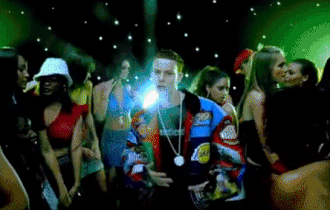
Yet, looking beyond the charts, Blazin’ Squad quickly became a staple of predominantly teen-orientated media. They promoted their material relentlessly on TV and were frequently plastered over the poster pages of magazines like Smash Hits. It mightn’t be evident in retrospect by judging the group purely on their commercial impact. Still, from a pop culture perspective, they were briefly – for better or worse – an inescapable phenomenon to anyone with even a passing interest in the charts. Yet, the marketing strategy for Blazin’ Squad led to some misperceptions. They weren’t manufactured, having formed at school and recorded a demo after a chance opportunity from a friend doing work experience in a studio. It’s that which caught the attention of East West Records, who signed the group and set about a mainstream launch. However, to achieve that, the label assumed a lot of input to In The Beginning,and there is a noticeable difference between the songs co-written by Blazin’ Squad and those composed for them (indeed, as if to emphasise that, just weeks before Crossroads debuted at #1, they released a white-label single, Standard Flow, which reached #78 in the chart). Indeed, it’s not hard to see why people might have dismissed the group as a gimmicky spin on the traditional boyband formula.
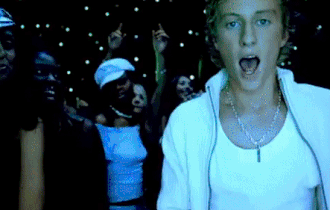
Blazin’ Squad had more control over the direction of Now Or Never, with a writing credit on every track. The album doesn’t break new ground, taking its lead from American-sounding pop, hip-hop, and R&B. Nonetheless, it comes off as a more authentic reflection of what a group of teenagers would credibly have been listening to. The lead single – We Just Be Dreamin’ – returned Blazin’ Squad to the top three for the first time since Crossroads, and radio was also a little more receptive to the track than most of those from In The Beginning. It didn’t necessarily feel that public perception had shifted meaningfully, though, which is where Flip Reverse became far more impactful as a follow-up.
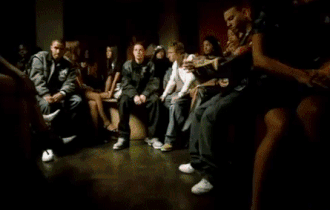
The song opens with a refrain: “Wah-w-w-wah-wah, w-w-wah-wah, w-w-wah-w-w-wah-wah, w-w-wah-wah” that repeats throughout and is immediately as naggingly catchy as it is enduringly distinctive. Once the beat drops, Flip Reverse reveals itself to be a slickly produced uptempo that credibly sells the creative ambition of Now Or Never. Indeed, there are occasionally parallels with Work It by Nelly and Justin Timberlake, which was released earlier in 2003 and reached #7 in the UK. It’s primarily because of a paraphrased line in the chorus (“I just want to see you work it”), which results in similar-sounding ad-libs rather than entire elements being borrowed. Nonetheless, if Blazin’ Squad were inspired – even unwittingly – by Work It, the comparisons are flattering. Flip Reverse doesn’t come across as a derivative imitation of what other acts were doing from a much bigger platform.
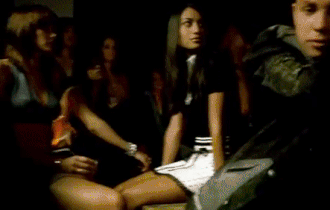
While the track’s lyrics raised eyebrows and were (knowingly) commented on at the time, in hindsight, it’s comical in the best way that Blazin’ Squad released and promoted such an unambiguously sexual song without any censorship whatsoever. Flip Reverse is rarely explicit, but from the first verse: “I’ma do it real good if you know how I felt, we could take it downstairs, like below the belt”, there’s little subtext to what it’s about. While some took the track as a reference to anal sex (not hard to see why with lines like: “I see her grindin’ in the club cheeks soft like a pillow”), Marcel (Rocky B) later clarified that it was about doggy style, specifically. Because Blazin’ Squad’s appeal lay broadly with the same audience as more traditionally sanitised boybands in the past, there might’ve been an assumption that Flip Reverse couldn’t be quite so forthright. But it’s all there in plain sight, and nothing is played as a double-entendre.

While the audacity of the track is undoubtedly part of its entertainment value, there’s more to Flip Reverse than that. The pre-chorus: “Me and the boys we’ll be blazing it up, so baby come take a ride in the back of the truck, if you wanna get crunk let me know who you are” oozes swagger and sells the energy of Blazin’ Squad out on the pull in a likeably endearing way. Furthermore, there’s a sentiment of camaraderie and togetherness that runs through the song: “And I will bring my clique, ‘cos that’s how we roll, and I will take these chicks, and I’ll take them home, I’m makin’ sure none of us leave this place alone…”. It conveys the group’s persona in an effective way where even those who mightn’t be fans of them could readily see the appeal, which hadn’t always previously been the case. Flip Reverse is peppered with chants to amplify the squad mentality. They’re given further amplitude by a team of backing vocalists – alongside the 10 members of the group – which includes Chloe Staines, Lynsey Brown, Emma Beard, and Aimee Kearsley, who made their chart debut a month prior as Clea.
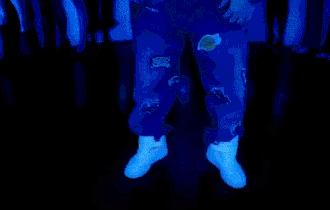
Flip Reverse packs a lot into a relatively short running time (the radio edit is less than three minutes), giving the track a sense of dynamism. Some of the rap verses are spat with a frantic urgency: “Yo, flip it, rip it, lick it, girls strip it, yo, can you kick it, the mic is the ticket, goes to sip it, freaky-deeky shh-t, flick it, lick it good, and put it in the places where you should and cannot take the hood, no one gives you the feelings the way I could” while the chorus gets right to the point: “Girl, I love the way you work it, and if you let me, I’m gonna flip reverse it”. Its brevity is proportionate within Flip Reverse and creates a memorable hook that’s notoriously easy to pick up from even the briefest exposure to it. While this isn’t necessarily one of those transformative moments where Blazin’ Squad suddenly found popularity with a broader demographic, it certainly made an impression in a way that none of their other original material did by siphoning the best (or, some might say, least-objectionable) aspects of the group into a slick pop package.
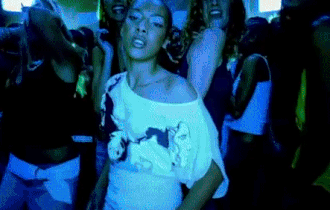
The music video for Flip Reverse is a functional presentation in that it’s not narrative-driven and instead uses the core themes – girls and clubbing – to create a visual accompaniment. While it doesn’t feel like a conscious attempt to portray a more mature Blazin’ Squad, that is what comes across. The styling is consistent with the group’s image, but it also feels less abrasively stereotypical and authentic to the fashion a group of teen ‘lads’ would wear to a club in 2003. Aesthetically, the sequences – particularly those shot in darker tones with blue filters and green lighting – convincingly resemble a club environment (albeit one where no alcohol or drinks of any kind are consumed). For what it is, the video complements Flip Reverse; fans of Blazin’ Squad are treated to plenty of shots where the group perform enthusiastically into the camera, while for anyone else, there’s nothing profoundly off-putting to compromise the enjoyment of the song. That might be a back-handed compliment, but it’s where Blazin’ Squad were working from regarding their image.
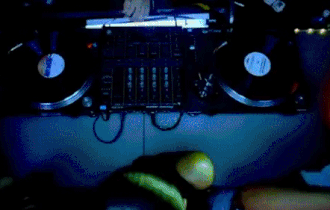
Flip Reverse debuted at #2 (behind Kylie Minogue’s Slow), earning the group their second-highest-peaking single. It sold 79,000 copies in 2003 – the 84th best-selling single of the year – and 106,000 copies in total. Blazin’ Squad’s second album was released a fortnight later and couldn’t have been better timed to capitalise on the momentum…though even that was only enough to see Now Or Never debut at #37. While a reasonably consistent peak with In The Beginning, the album didn’t remain in the chart for as long as its predecessor, exiting after two weeks. The campaign did continue with a further single – Here 4 One – which became the group’s sixth and final top ten hit. However, it did little to generate significant interest in Now Or Never, and they parted with their record label shortly afterwards.
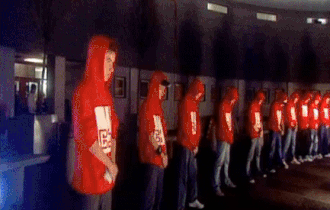
As part of the promotion for Flip Reverse, Blazin’ Squad made an appearance on the first show of the ill-fated Top Of The Pop relaunch in 2003. The performance was ambitious in scale (by the show’s usual standard, at least), as it included around 100 people wearing red Blazin’ Squad-branded hoodies. After starting outside in the circular courtyard, they file into the Top Of The Pops studio and gather on two stages separate from the one where the group are positioned and…that’s about it. The execution doesn’t quite sustain the ambition. However, in Blazin’ Squad’s defence, it does feel like a concept intended to happen around what is otherwise a relatively straightforward (mimed) performance rather than something they were directly involved in creating. If anything, it’s indicative of how the relaunch missed the mark. The intention was to create a magazine show and put just as much – if not more – focus on pre-release songs than those which had already charted. Certainly, Blazin’ Squad’s fanbase is the sort of audience that might have drifted away from shows like Top Of The Pops, and the BBC would’ve hoped to appeal to. But Flip Reverse had already been performed (live) several weeks earlier after entering the chart at #2. By the time of the relaunch, the song was at #14, so it probably wouldn’t, under usual circumstances, have warranted being featured again.
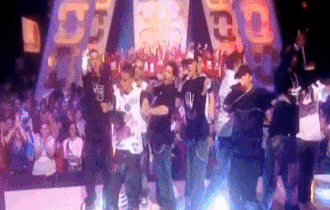
Even if Flip Reverse wasn’t enough to change the trajectory of the Now Or Never campaign, it’s still an important single for Blazin’ Squad. The track gave them a signature hit of their own. And, no matter how fleeting their mainstream popularity, the group didn’t deserve to be defined by a cover version alone. Indeed, had Blazin’ Squad released more material like Flip Reverse, their legacy might have been entirely different. Maybe.



